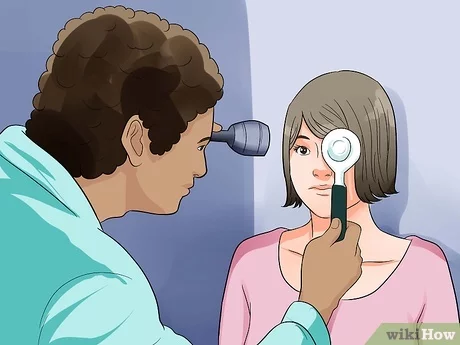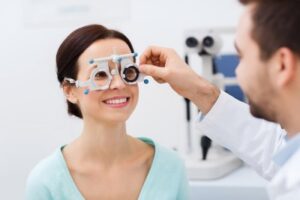How To Take Care Of Your Eyes

How To Take Care Of Your Eyes: The most vital of your five senses is certainly your vision. Although eye health is closely related to overall health, there are several nutrients that are particularly crucial for your eyes. These vitamins and minerals support eye health, shield your eyes from harmful light, and slow the progression of age-related degenerative disorders. How To Know If You’re Depressed :

To monitor any changes in your eyesight and to identify any potential health risks as early as possible, experts advise visiting an optometrist or ophthalmologist on a regular basis. In addition, there are several simple everyday activities you may engage in to help keep your eyes healthy.
According to research, maintaining a good diet, exercising frequently, and donning sunglasses outside can all contribute to maintaining eye health. Continue reading to find out more about how to safeguard your vision and prevent eye-related health issues.
Read Also: How to Stay Focused (Steps and Requirements)
Overview of prevalent eye conditions
As you become older, you run a higher risk of acquiring an eye condition. The most prevalent eye conditions include: How to Look like A Model
Cataracts
a syndrome that causes cloudiness in your eyes. One of the main causes of vision loss and blindness worldwide is age-related cataracts.
Diabetic retinal disease
Retinopathy, a leading cause of vision loss and blindness that is linked to diabetes, is brought on by high blood sugar levels harming the blood vessels in your retina.
Dry eye illness
a disorder characterized by insufficient tear production, which causes your eyes to dry out, causing pain and perhaps impairing your vision.
Glaucoma
a set of illnesses that cause the optic nerve, which transmits visual information from the eyes to the brain, to gradually deteriorate. Glaucoma can result in blindness or poor vision.
Aging of the retina
The center of your retina is called the macula. In developed nations, age-related macular degeneration (AMD) is one of the leading causes of blindness. How to remove paint from clothes (2023 Review)
Practicing Good Eyecare habits
Visit a doctor of ophthalmology frequently
These are skilled professionals with a focus on maintaining your eye health. Optometrists or ophthalmologists are two possible candidates. Have your eyes tested periodically or if you experience visual issues to keep your eyes healthy? Learn more about your eyes, and when you have any questions, consult your eye doctor. Learning more about your eyes and how to prevent eye disorders will assist you to feel more in charge of your health.
- In your 20s and 30s, if you don’t have any vision issues, you should see an eye doctor every five to ten years.
- You should see an eye doctor every two to four years between the ages of 40 and 65 if you don’t have any visual issues.
- After the age of 65, if you don’t have any vision issues, you should see an eye doctor every one to two years.
Read Also: How To Build Self-Esteem
At the end of the day, take off your eye makeup.
Before going to bed, always take the time to remove your eye makeup. Never go to sleep with makeup on your eyes. Going to bed with mascara or eyeliner on can irritate your eyes if it gets in there.
- Additionally, sleeping with your eye makeup on might clog the pores around your eyes, which can result in styes or (hordeolum). Antibiotics may be needed to treat a serious sty, or a doctor may even need to remove it.
- When you’re too exhausted to complete your nightly cleansing ritual, keep makeup removal wipes close to your bed.How to be a Medical Doctor(Step-and Requirements)
At the conclusion of the day, remove your contacts. Attempt to wear contacts for no more than 19 hours. Long-term contact lens use can seriously hurt your eyes and permanently destroy your vision.
- Unless specifically advised to do so by your doctor, never go to sleep wearing your contact lenses. Doctors advise taking a frequent vacation from wearing contact lenses for your eyes throughout the night since your eyes need regular supplies of oxygen and lenses hinder the passage of oxygen to the eyes, especially when you sleep.
- Unless you are using tightly fitting swimming goggles, avoid swimming while wearing contact lenses. If necessary, it is preferable to use prescription goggles. If you keep your eyes closed when using shampoo or soap and are likely to get soap in your eyes, wearing contacts in the shower is acceptable.
- Regarding how to use the contact lenses and the solutions, go by the manufacturer’s and your eye doctor’s instructions. Washing your hands before handling your contact lenses is one of the most crucial precautions.
Sparingly use eye drops that reduce allergies: While using an allergen-reducing eye drop everyday can exacerbate the issue, using one during allergy season can help “get the red out” and soothe itching. Rebound redness, which occurs when eyes no longer respond to eye drops, can result in severe eye redness.
- Eye drops that reduce allergies operate by oxygenating the cornea by restricting blood flow to it. Your eyes aren’t getting enough oxygen from the blood, despite the fact that they don’t feel swollen and irritated anymore. Because oxygen is necessary for the eye muscles and tissues to function, that is not ideal. Even edema and scarring can be brought on by the absence of oxygen.
Put on your shades
Your risk of cataracts and age-related macular degeneration increases if you spend too much time in the sun. Use sunglasses that completely or nearly completely block UV-A and UV-B radiation to safeguard your eyes.
- Your eyesight can be harmed by prolonged UV exposure, therefore wearing sunscreen when you’re young can help avoid vision loss in later life. UV light exposure has been associated with eye diseases such as pinguecula, pterygium, macular degeneration, cataracts, and macular degeneration.
- Protecting youngsters from dangerous rays is crucial since UV ray damage to the eyes accrues over a lifetime. When your kids are outdoors in the sun for an extended amount of time, be sure they are wearing hats and sunglass shields.
- Even if you are wearing UV sunglasses, you should never stare straight into the sun. If the retina is exposed to full sunlight, the sun’s rays can harm the delicate areas of the retina.
Get lots of rest
Lack of sleep may be a factor in ocular fatigue. Eye irritation, difficulty focusing, dryness or excessive tears, blurred or double vision, light sensitivity, and pain in the neck, shoulders, or back are all signs of eye tiredness. To help reduce eye fatigue, make sure you receive enough sleep each night.
The average adult needs 7-8 hours of sleep per night. Your eyes require recharging much like the rest of your body, and they do so when you sleep. Therefore, ensure that you get enough sleep every night to keep your eyes refreshed and in good health.
Exercise Regularly
Other disorders like diabetes can be avoided with regular exercise. You can lessen your risk of obtaining major eye disorders like glaucoma and macular degeneration by exercising for at least 30 minutes three times each week.
Remain hydrated
Your body needs enough fluids to function properly on all levels, including the eyes. Your eyes won’t become dry and inflamed if you drink enough water.
To minimize puffiness, apply cucumber slices to your eyelids
Before going to bed at night, gently press chilled cucumber slices on the eyelids for 10 to 15 minutes to reduce and avoid puffiness under the eyes and on the eyelids.
- If placed over the eyes, green tea bags may also help reduce puffiness. Place the tea bag over your eyes for 15 to 20 minutes after briefly soaking it in cold water. The tea’s tannins should aid in reducing inflammation.
Avoid smoking
Smoking increases your risk of cataracts, age-related macular degeneration, and other eye diseases. Smoking can harm your optic nerves, which over time could have a negative impact on your vision.
Read Also: How To Stop Bleeding(steps and Requirements)
Using a Computer While Safeguarding Your Eyes
If you can, try to limit how much time you spend staring at your phone, tablet, and computer screens
Science has not yet established that staring at computer screens permanently harms the eyes, however, it may result in dry eyes and eye strain. The glare from computer screens wears down the eyes’ muscles because it is either too bright or too dark. There are methods you can employ to give your eyes a break if you are unable to restrict your screen usage.
Make sure the screen is level with your eyes
Long periods of time spent looking up at or down at a computer screen might strain your eyes further. Place yourself and your computer so that you are staring directly at the screen.
Don’t forget to blink
When looking at a screen, people blink less, which results in drier eyes. When you’re sitting down and staring at your computer screen, make an effort to blink every 30 seconds to prevent dry eyes.
Follow the 20-20-20 principle
You should follow the 20-20-20 rule if you want to maintain your eyes healthy, which stipulates that:
- Look away from your computer screen and set your eyes on something 20 feet away from you once every 20 minutes.
- Blink 20 times in a row to avoid dry eyes.
- Get up from your seat and move about for 20 seconds every 20 minutes. This benefits your vision as well as good posture and healthy blood flow throughout the body. Yes, it prevents you from being inactive.
Work in well-lit environments
Although it won’t harm your eyes, working and reading in low light can strain your eyes. You should only read and work in well-lit locations to ensure your comfort. Stop for a while and take a rest if your eyes begin to feel fatigued.
Optimal Nutrition for Eye Health
Consume meals that are excellent for your eyes
Healthy eyes depend on zinc, lutein, zeaxanthin, omega-3 fatty acids, vitamins C, lutein, and vitamin E. These nutrients can guard against age-related macular degeneration, cataracts, and lens clouding.
- Overall, your eyes will benefit from a healthy, balanced diet.
Omega-3 fatty acids
This may aid in the prevention of other eye conditions. Taking at least 500 mg of long-chain omega-3s daily may lower the incidence of diabetic retinopathy, according to a study of middle-aged and older persons with diabetes. Omega-3 fatty acids, on the other hand, are ineffective in treating AMD (22).
Vitamin C
More than many other organs, your eyes need a lot of antioxidants. Although controlled research on its impact on eye health are sparse, the antioxidant vitamin C looks to be particularly significant. In comparison to other physiological fluids, the aqueous humor of the eye has the highest quantity of vitamin C. Your eye’s outermost layer is filled with a fluid called aqueous humor.
Lutein and zeaxanthin
Yellow carotenoid antioxidants lutein and zeaxanthin are referred to as macular pigments.
The macula, the central region of the retina, a layer of light-sensitive cells on the rear wall of your eyeball, is where they are concentrated.
Zeaxanthin and lutein serve as a natural sunscreen. They are believed to be essential in shielding your eyes from damaging blue light.
Controlled investigations have demonstrated a relationship between lutein and zeaxanthin intake and retinal levels.Vitamin E
A class of fat-soluble antioxidants known as vitamin E shields fatty acids from damaging oxidation. The retina contains a lot of fatty acids, therefore getting enough vitamin E is crucial for good eye health.
It’s not clear whether supplements offer any further advantages if you’re already getting enough vitamin E from your diet, even though severe vitamin E deficiency can cause retinal degeneration and blindness.
Zinc
High quantities of zinc are present in your eyes. Several important enzymes, including the antioxidant superoxide dismutase, contain zinc. Additionally, it seems to play a role in the development of the retina’s visual pigments. This is why a zinc deficit could result in night blindness.
Eat carrots
Ingest carrots. Eating carrots help your eyesight, so do it.
Keep everything around you tidy.
Make sure the places you visit are kept up and clean because exposure to dirt and dust can irritate the eyes. Keep your workspace clutter-free and routinely change your bedding and towels.
Read Also; How to Stay Fit at Home
Conclusion
Your eye health is crucial to your overall well-being. The majority of people use their eyes to view and comprehend the world around them. However, some eye conditions can result in vision loss, making early detection and treatment of eye conditions crucial. If your doctor suggests it or if you notice any new vision issues, you should have your eyes examined. Additionally, maintaining good eye health is equally as crucial as maintaining good physical health.
A balanced diet and regular exercise are examples of healthy lifestyle practices that may help avoid many chronic diseases, including eye disorders.
Consuming sufficient amounts of the nutrients mentioned above may help lower your risk. The health of the eyes may also be affected by other vitamins.
FAQs & Answers
Can sun exposure cause cataracts?
Yes. Your risk of developing cataracts can increase with continued sun exposure. Because of this, the Academy of Ophthalmology advises always wearing UV-protective clothing outside, including hats and sunglasses.
As you become older, should you have your eyes tested more frequently?
Yes. As you become older, your risk of developing conditions like cataracts and glaucoma also rises. However, regardless of age, comprehensive eye exams are advised once a year for all adults. If you are overdue for your yearly eye exam, contact one of our many Long Island locations today to schedule your appointment.
Can having too much “screen time” cause issues?
Yes, prolonged screen use can result in a condition called digital eye strain. Headaches, blurred vision, and neck pain may result from this.




